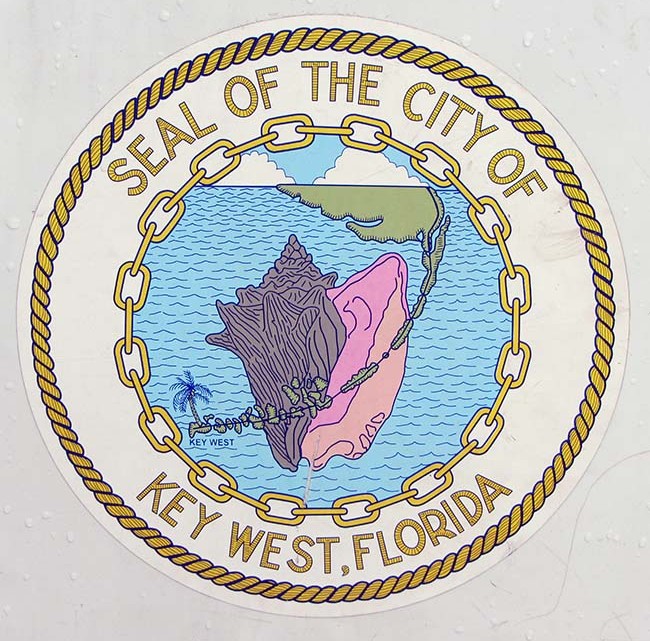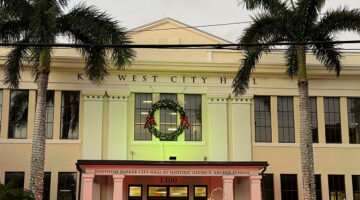Key West City finances in trouble, warns budget director
BY PRU SOWERS
KONK LIFE STAFF WRITER
Key West City Commissioners have prided themselves on keeping the local property tax rate essentially unchanged over the past 10 years. But that has created a financial crisis going into the next budget year, which begins on Oct. 1, according to finance director Mark Finigan.
As a result, not only are property taxes likely to go up an as-of-yet undetermined amount in the 2019-2020 fiscal year, local fees may also increase, some significantly. City staff layoffs and a possible elimination of the city-operated emergency medical services unit are also on the table, according to city manager Jim Scholl.
Finigan said he anticipates a $4 to $5 million budget shortfall if all the projects department heads have been asked to undertake are approved. But raising the property tax millage rate the maximum 13 percent allowed under state statutes won’t be enough.
“Even if you increased by 13 [percent], you’d still only get about a million and a half dollars of new revenue. So, you’re still looking at a large amount that we’re either going to have to pare back or we’re going to have to realize it through revenue enhancements or we’re going to have to recognize it through expenditure reductions,” Finigan said at the May 30 special commission meeting.
There are several reasons why costs are rising significantly faster than the revenue to pay for them in Key West. One is that commissioners in past years have been politically reluctant to ask residents to pay higher taxes, even when a slight increase every year would have been relatively easy for property owners to bear. Another is that residents have been demanding a better quality of life, including improved roads, parks and sidewalks. The new administration of Mayor Teri Johnston wants to meet those needs but, again, it costs money to do so. Finigan said the tax rate in the new fiscal year will be “extraordinarily above” rollback if commissioners try to implement all the projects they have said they want. Rollback is the millage tax rate that generates the same number of revenue dollars as the year before.
“We are up against a wall where our expenses continue to increase but our revenues don’t,” said Scholl.
“We should have, the last couple of years anyway, done slight [property tax] increases instead of hitting rollback,” said Commissioner Jimmy Weekley.
A third reason for the expected financial shortfall is that one source of revenue that has consistently provided a bucket of predictable money every year is falling. Parking fees and fines, which were budgeted at $6.2 million in the current 2018-2019 fiscal year, are coming in four percent lower, a potential loss of $248,000, if parking collection continues at this rate until Sept. 30, the end of the fiscal year.
“If it’s because [reducing car usage in the city] is having the desired consequences of making all of these parking improvements, which relieves the congestion downtown, then that’s probably a good thing. And we’ll have to make up that loss of revenue in other ways,” Finigan said.
Those “other ways” might include creating a number of new local fees, including charging for commercial use of public property such as beach weddings, green markets, fitness classes in public spaces and non-profit organizations’ use of city-owned property. Some existing fees could also be increased, including charging a “convenience fee” for using a credit card to pay the rent on city leases, parking and fuel. Currently, the city absorbs the two percent hit credit card companies charge. If that cost was transferred to card users, the city could generate up to $600,000 a year in new revenue, Finigan said.
Another source of new revenue would be to increase the fee structure for business taxes, generating $47,000, and assessing the maximum delinquent payment fee for business owners who pay their taxes late. That could generate up to $135,000, Finigan said.
Commissioners largely sat in stunned silence during Finigan’s two-hour presentation. Finigan asked them to ponder what type of financial strategy they want to implement and to think long-term, not just one fiscal year at a time. The next budget workshop is July 24 at City Hall.
“This community and primarily this city at this point financially is at the crossroads of having to make some really long-term decisions relative to how they’re going to conduct their financial business into the future,” Finigan told the commission.
Scholl said one way of reducing expenses is to implement a hiring freeze, lay off employees and eliminate the city-operated ambulance and emergency services department, resulting in 16 firefighters who work in EMS losing their jobs. The city took over providing emergency services in 2014 – it had contracted with a private ambulance service prior to that – as a way to reduce expenses. Having those EMS employees on the city payroll instead of a private contractor is more expensive, Scholl said.
Scholl also warned commissioners not to fall back on the financial trick they have used in the past to reduce expenses enough to achieve rollback. Commissioners have taken money out of the city’s reserve fund the past two years to boost revenue enough to avoid higher property taxes, over Scholl’s objections. This time, one year after Hurricane Irma caused just under $11 million dollars in damage in Key West and cut the reserve fund by about two-thirds because of all the additional expenses, Scholl said the rainy-day account needs to remain intact in case of another damaging storm.
“It’s very, very important to understand the necessity of having the reserve funds and to be able to support disaster recovery if it’s necessary,” he told commissioners.
Monroe County and the city of Marathon have both used up the majority of their reserve funds paying for Irma storm damage while waiting for FEMA reimbursement. The county has had to take out municipal loans to cover the shortfalls, resulting in an estimated $86,000 in interest fees.
[livemarket market_name="KONK Life LiveMarket" limit=3 category=“” show_signup=0 show_more=0]



Why not sell transient Airbnb licenses again, they would generate plenty
you can fix theparking easy – get rid of ride sharing – It will decrease the traffic in KEy West dramatically